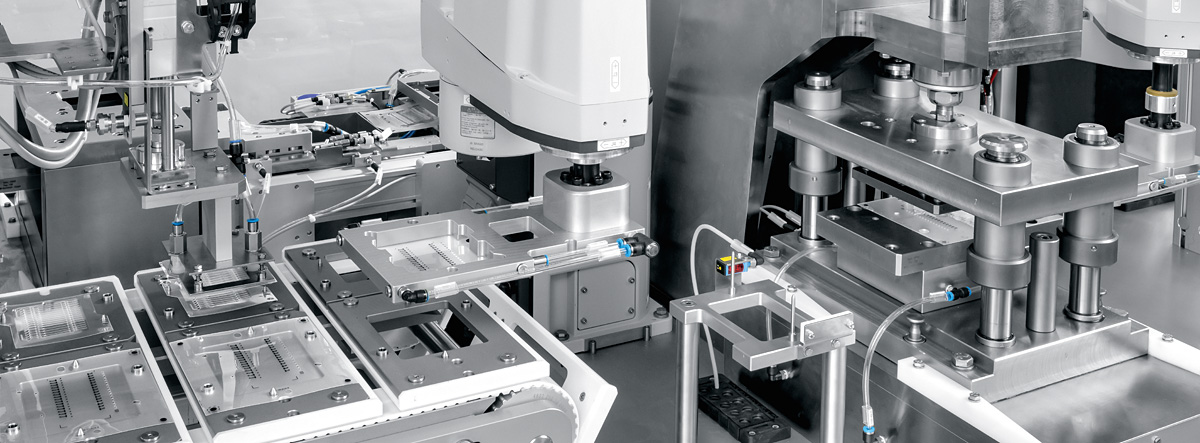Even the slightest deviations in human genetic material can be responsible for the onset of disease – and in many cases, therapies can only be developed if the genetic background is known. It was a real sensation when in 2003 the first human DNA was completely decoded after more than 13 years of work, and costs amounting to hundreds of millions of euros.
Nowadays, the decoding of genetic material is commonplace in many laboratories and only takes a few hours. And while costs have also come down dramatically, a price of around 1,000 euros per analysis is not insignificant. Furthermore, since genetic material reacts very sensitively to external influences such as temperature fluctuations, satisfactory sample quality must be ensured before each sequencing.

The credit card-sized ScreenTape by Agilent promises fast quality control of DNA or RNA samples.
Reliable quality assurance
This is where Agilent’s credit card-sized ScreenTape comes in, which promises rapid quality control of DNA or RNA samples. “The ScreenTape works according to the principle of electrophoresis, in which nucleic acid strands are separated from each other. Normally this is a very time-consuming procedure,” explains Jan Eickhoff, Manufacturing Engineer at Agilent Technologies.
Each ScreenTape has 16 lanes – enabling the analysis of 16 different samples. The corresponding analytical instrument automatically places the sample on one of the lanes and then, depending on the field of application, analyzes various parameters such as quantity and purity. The results are available after about one minute. Thus, it can be determined even before the time-consuming and expensive sequencing run whether the genetic material is suitable for further evaluations.
“Harro Höfliger has proven to be a reliable partner who does not give up until the machine is running smoothly.“Jan Eickhoff, Manufacturing Engineer at Agilent Technologies
Precise lamination
Since production first began, Harro Höfliger has been providing one of the technologies used by Agilent to manufacture the ScreenTapes. After developing a punching machine and a line for packaging the tapes into four-side sealed pouches, the third joint project, the “Trinity”, is about to go into operation.
Maschine für Agilent Technologies
The machine developed by Harro Höfliger precisely joins the two main components of the ScreenTape, which consist of film material: The Printed Layer with its imprinted electrode connections and the thermoformed Process Layer. The two layers are laminated in three stations running in parallel.
Before and after lamination, various camera systems check for the presence of contamination or scratches on the sensitive film material; a rather important aspect because the samples are optically evaluated in the analyzer.

The ScreenTape
Depending on its design, the ScreenTape is used for the evaluation of DNA or RNA samples. In the analytical instrument, one sample each is placed on one of the lanes via the buffer chamber. After voltage has been applied, various parameters are automatically analyzed to ensure that the sample quality is satisfactory for further evaluation.
Guaranteed process reliability
Since the product is made of sophisticated film material and can only be sealed within a narrow temperature window, the Harro Höfliger Engineering & Innovation Services specialists have set up and thoroughly tested the “Trinity” lamination unit in advance. “This is how we were able to make sure that the process works in principle. In addition, it enabled us to make joint decisions about the control technology involved and develop parameters for the subsequent machine,” explains Jan Eickhoff. Another important aspect of quality assurance is the database link of the “Trinity”: All process and batch data is digitally recorded, making it possible to trace the creation of each individual tape down to the last detail.

The machine developed by Harro Höfliger precisely joins the two main components of the ScreenTape, which consist of film material: The Printed Layer with its imprinted electrode connections and the thermoformed Process Layer.
Jan Eickhoff is convinced that the fields of application for sequencing processes – and thus the market for the ScreenTape – will continue to grow. “Among other things, this technology will open the door to personalized medicine, where decisions on what helps patients are made on a case-by-case basis.”
About Agilent
![]() Agilent Technologies Inc. (NYSE:A) is a global leader in life sciences, diagnostics and applied chemical markets. With more than 50 years of insight and innovation, Agilent’s instruments, software, services, solutions, and people provide trusted answers to customers’ most challenging questions. The company generated revenues of over $4.91 billion in fiscal 2018 and employs 15,550 people worldwide.
Agilent Technologies Inc. (NYSE:A) is a global leader in life sciences, diagnostics and applied chemical markets. With more than 50 years of insight and innovation, Agilent’s instruments, software, services, solutions, and people provide trusted answers to customers’ most challenging questions. The company generated revenues of over $4.91 billion in fiscal 2018 and employs 15,550 people worldwide.
Download this article as PDF file
Photos: shutterstock/Blackboard, Agilent Technologies, Helmar Lünig

